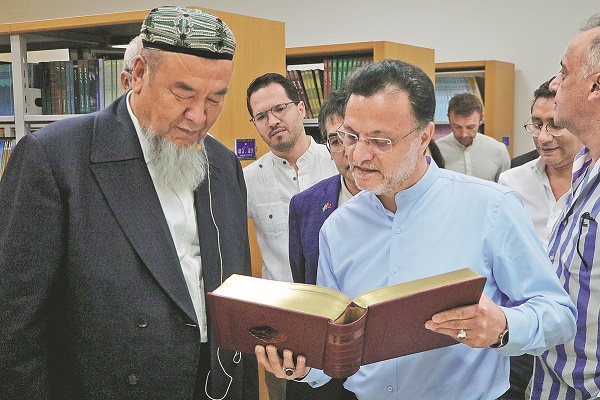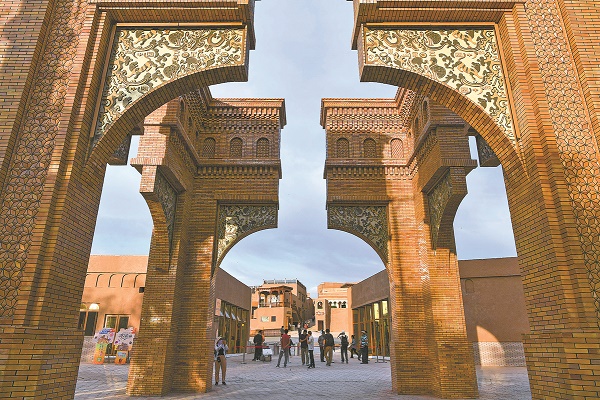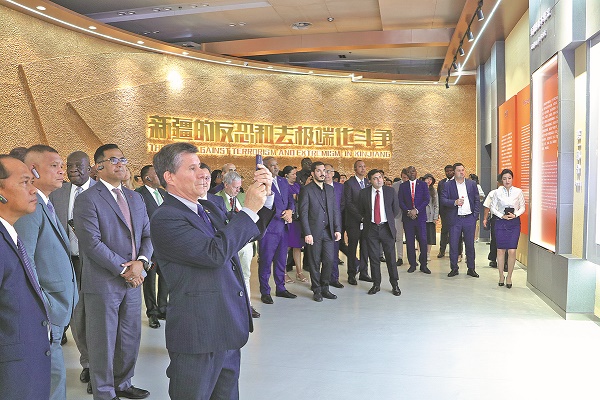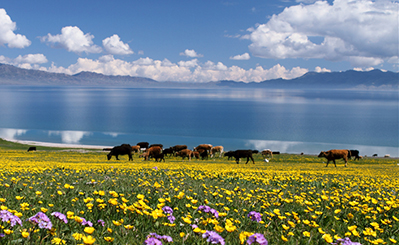Foreign diplomats impressed by progress made in Xinjiang

Overseas envoys meet with Abdureqip Tomurniyaz (left), president of the Xinjiang Islamic Institute in Urumqi. ZHAO CHENJIE/XINHUA
Envoys meet locals to gain insight into region's socioeconomic development
When Colombian diplomat Lucho Roa visited Kashgar prefecture in the Xinjiang Uygur autonomous region last week, he was amazed at how much had changed since his first visit in 1999.
"Xinjiang is a wonderful place. I'm delighted to be back after 24 years. This time, I have seen many modern buildings and local residents living much better lives. The people remain as joyful and friendly as they were back then," he said.
In Kashgar Ancient City, a complex of earthen buildings with a history of some 2,000 years, Roa explored a bazaar, where he recalled that there used to be a farmers' market nearby, which emitted a strong odor.
In 2010, the local government launched a project to renovate dilapidated buildings in the ancient city while preserving local residents' traditional lifestyles. Today, the old city covers an area of 3.6 square kilometers and is home to more than 20,000 households.
As Roa strolled along bustling streets lined with shops selling a wide variety of products, ranging from Uygur handicrafts to local delicacies, he brushed shoulders with a crowd of tourists visiting Kashgar from different areas of the country during the peak tourism season in China.
Roa and 39 other senior diplomats, who represent 25 countries, embarked on a visit to Kashgar and Aksu prefectures, as well as the regional capital Urumqi from July 31 to Aug 4.
Many of the diplomats, especially those who had recently taken up ambassadorial posts in China, were making their first visits to the region, where they engaged in face-to-face interactions with local people to gain an insight into Xinjiang's socioeconomic development.
Mohsen Bakhtiar, the Iranian ambassador to China, who arrived in the country in June, said, "During this visit, we all learned more about beautiful Xinjiang and the achievements made in this region.
"Looking back, the changes in Xinjiang, especially in the past 10 years, are fundamental and amazing," he said, emphasizing the substantial progress made by the region in areas such as the economy, transportation, agriculture and culture.
Official data show that in 2021, Xinjiang's GDP was double that of 2012, reaching nearly 1.6 trillion yuan ($232.8 billion). Over the past decade, more than 70 percent of the region's fiscal spending has been allocated to improving residents' livelihoods.
Pick Fung Ho-Chong, Suriname's ambassador to China, shared her impressions of the remarkable developments she witnessed in Xinjiang, particularly upon her arrival in Kashgar.
"It is really a contrast from what I had heard. Seeing is believing, and I believe what I see, witnessed by the enormous development that has been going on," said the envoy, who arrived in China in February as the South American country's top diplomat.
"The people are so enterprising. They are now selling literally everything from the old days to today. People in Kashgar are doing a great job in conserving traditional items while still enjoying the modern world," she said.
The ambassador was also impressed with the vibrant and colorful clothing worn by the people of Xinjiang, a striking departure from the attire in most Chinese cities.
"The women here are so beautiful. That alone gives me an impression of just how much they are enjoying life," she said.
Michael Campbell, Nicaragua's ambassador to China, was inspired by efforts to improve local people's living conditions through modernization. He was particularly impressed by a potable water safety project in Jiashi county, located near the Taklimakan Desert, the second-largest shifting sand desert in the world.
For years, water scarcity and safety concerns have plagued the residents of Jiashi due to harsh natural conditions. However, thanks to completion of the project in 2020, some 460,000 people now have access to safe drinking water through newly constructed or renovated pipelines running for a total length of 1,827 kilometers.
"That is a fundamental victory," Campbell said, adding that his country is also focusing on providing people with sanitary potable water and improving livelihoods in areas such as housing, education and food security.
"When we had the opportunity to see the water project here, we were very impressed," he said, adding that Nicaragua can learn from China's experience in this respect.
Campbell, who arrived in China in May as the Nicaraguan ambassador, has since visited not only Xinjiang but also Shandong and Hebei provinces, as well as Yiwu city, Zhejiang province. He intends to visit all 34 provincial-level regions in the country.
"Every single province has its own individuality. I think Xinjiang is wonderful and beautiful in its own way," he said.

Tourists explore Kashgar Ancient City in June. HU HUHU/XINHUA
Diversity protected
Campbell said he also witnessed the support given to religious sites in Xinjiang, which is home to many ethnic groups.
He said it is crucial to consider all the ethnic groups in a multi-ethnic country, as this contributes to the nation's prosperity and creativity. "This is something that we can see here," he added.
During a visit to the Xinjiang Islamic Institute in Urumqi, the envoys had in-depth exchanges with Abdureqip Tomurniyaz, president of the institute, learning about the students' curriculum and daily routines.
Ijaz Ahmad, minister at the Pakistani embassy in China, was drawn to the Uygur version of local newspaper Xinjiang Daily when he visited a reading room at the institute.
"We were really impressed with this institute, and it shows the remarkable efforts of the Chinese government (in terms of) how to preserve the culture, language and religious beliefs of the local people," he said.
Erika Lizardo, minister-counselor at the Peruvian embassy in China, was greatly impressed by efforts to preserve the Kizil Grottoes, one of the earliest large-scale Buddhist grotto sites in the country, and a UNESCO World Heritage site.
She praised China for embracing its diverse regions and the importance it places on preserving cultural heritage.
Arlindo Do Rosario, the Cape Verdean ambassador to China, said the trip to Xinjiang allowed him to witness the region's remarkable progress across various sectors.
He hailed the Chinese authorities' efforts to promote the well-being of the region's different ethnic groups.
"In addition, the interactions I had with local representatives and communities gave me a better understanding of the development policies implemented in the region, especially those aimed at respecting ethnic and cultural diversity," he added.

Delegates visit an exhibition in Urumqi showcasing Xinjiang's efforts to combat terrorism and extremism. ZHAO CHENJIE/XINHUA
Evidence lacking
The diplomats said that during the trip they found narratives made by the United States and European countries about Xinjiang were complete fabrications used to contain China's development.
Martin Charles, Dominica's ambassador to China, said he had not seen any evidence to support the claims made by Western media about Xinjiang, including so-called human rights violations.
"They say when you see, you believe, and those of us who have come here have an opportunity to say to Western media that what you have been reporting is not true," he said.
"I have not seen anyone being forced to do labor or other tasks. Instead, I've seen happy residents. Some countries are probably using (the untruths) as an attempt to contain China's rise."
Charles, who joined the trip despite a tight schedule, said that people in Xinjiang enjoy access to education, housing and potable drinking water as a basic human right.
"It seems to me that China is looking after its people. The rest of the world needs to look at how to develop people and empower people so that you can have a healthy, happy society," he said.
Luamanuvae A. Mariner, the Samoan ambassador to China, said the diplomats were encouraged by efforts made by the authorities in Xinjiang, especially for the Uygur population.
He suggested that whoever is criticizing China should visit Xinjiang. "What's important is that they come, see and experience, meet the people, talk to the people, experience the culture, experience the environment. That's something completely different from what you read about in Western media," he said.
After viewing an exhibition in Urumqi on Xinjiang's efforts to combat terrorism and extremism, Kaba Ibrahim Sinkoun, first secretary at Guinea's embassy in China and also a Muslim, said that most countries, including Muslim nations, have expressed support for China's anti-terrorism efforts when voting in the UN.
"Because the first human right is to live in security, China has to deliver basic security for all its citizens, like all other countries," he said.
Campbell, the Nicaraguan ambassador, said some Western media outlets are seeking to undermine and even misinterpret the efforts made by China against terrorism and extremism.
"No country in the world can accept terrorism and extremism within its borders. This is China's right," he said.
 Attractions
Attractions Dining
Dining Culture
Culture